
By Jessica Holmes
Hello again, everybody, and welcome back to our adventure through Time and Space on Doctor Who! This second series is off to an excellent start, courtesy of Louis Marks, and I can’t wait to tell you all about it. In excruciating detail, no less. Let’s get stuck in to Planet Of Giants, shall we?
PLANET OF GIANTS
AWOOOGA, AWOOOGA. We’re barely a minute in and already things are going wrong aboard the good ship TARDIS. As the Doctor brings her in to land, the doors start opening by themselves. Fortunately, the companions manage to get them closed and they land safely. Or do they? The Doctor is very agitated about the doors opening, but doesn’t do a good job of explaining what it is that’s bothering him. Something strange is afoot, that’s for sure.
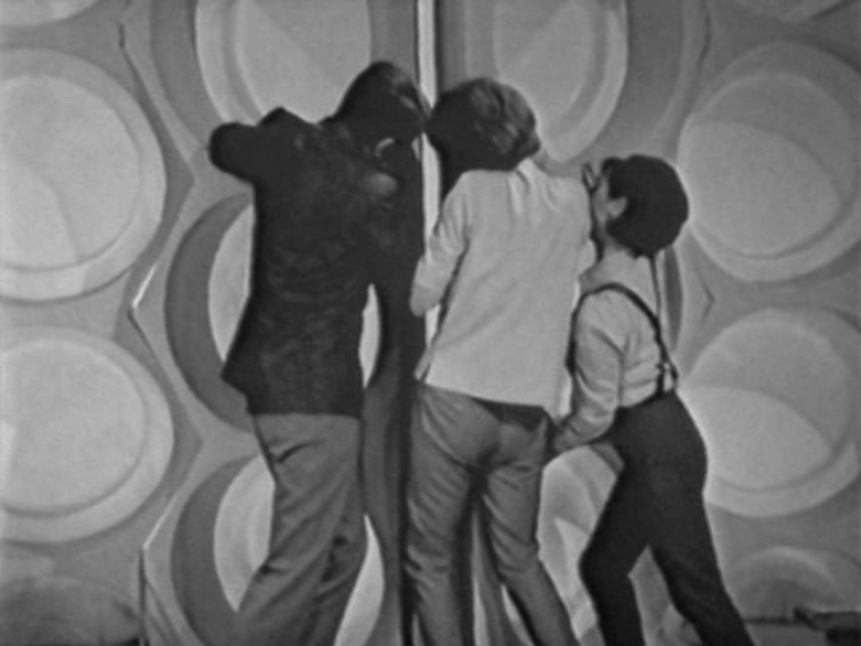
Something very strange indeed, as the Doctor sincerely apologises to Barbara in case he was rude to her under pressure. Goodness, he really has mellowed out, hasn’t he?
However, when they try to look outside with the scanner, it blows up, as if it were trying to display something ‘too big for its frame’. Pardon? I am quite certain that the Doctor is a bit more than 12 inches tall, yet Bill Hartnell has yet to explode out of my television screen in a shower of glass.
Oh, and apparently the reason that the doors opened during landing was the ‘space pressure’ being too high. No, I’m not sure what that means either.
Still, it’s all over now. Time to see what sort of planet we've landed on.
A rocky one, by the looks of it. So far, so normal.
And then Barbara finds a dead earthworm. Sound ordinary? You haven’t seen the size of it.
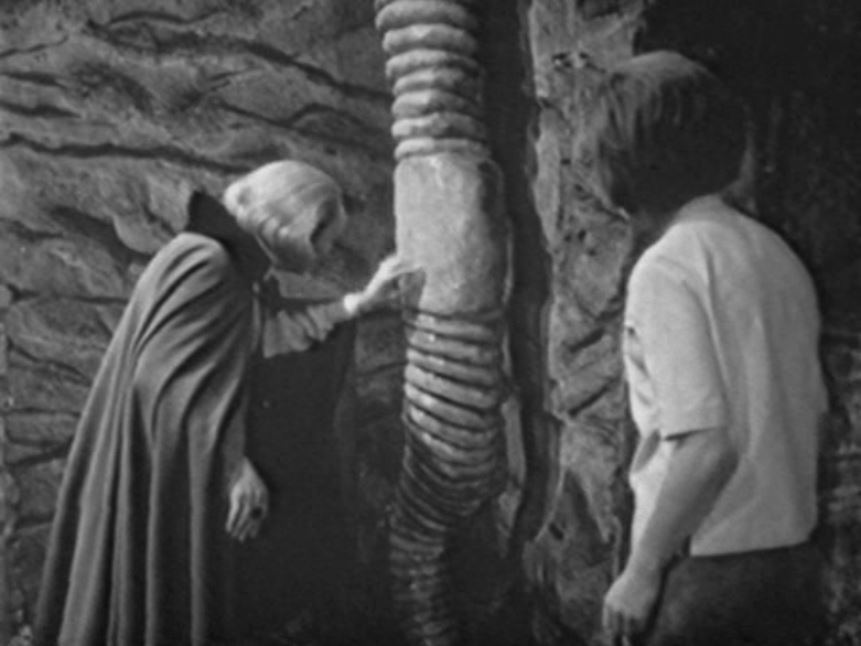
A few moments later, Ian and Susan come upon some massive ant eggs, followed by a giant dead ant.
I think we can guess what’s really happening on this so-called 'planet of giants'.
Ominous music builds as Ian comes upon a gigantic matchbox. Prepare for me to gush over the set design quite a lot over the course of this article. It really is very good and creative, and there has been a definite step up in quality, boding well for the rest of the series. That, or they spent all the budget on Planet Of Giants, and the rest of the series will be taking place in my back garden.
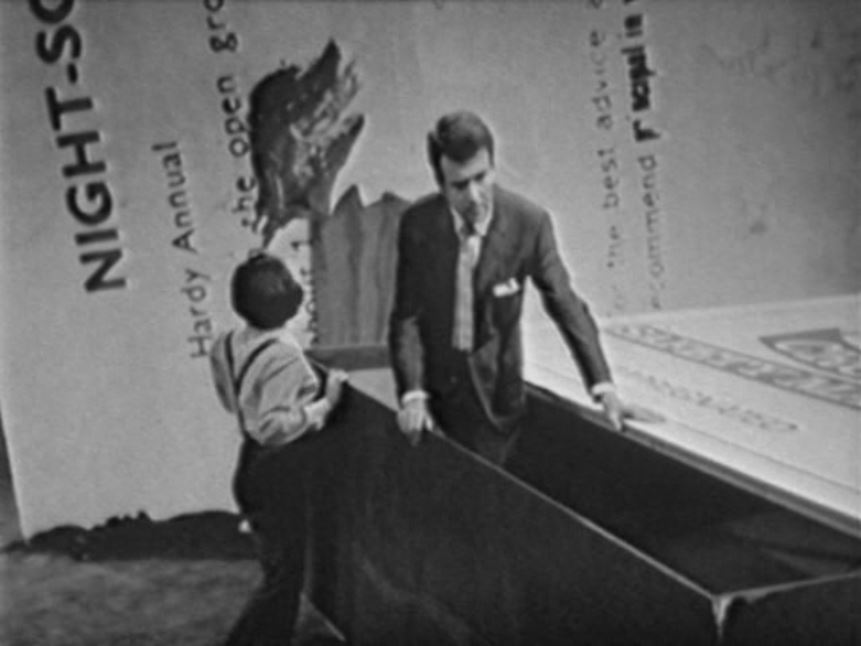
And the points go to Susan for working out what’s going on first: this isn’t a planet of giants after all. They’ve shrunk!
So, the rock formations? Paving stones. They’re between the paving stones on someone’s charming garden path. Basically, when the doors opened during landing, the space pressure made the TARDIS and all its occupants shrink… or something. No, I don’t buy it either.
But then everything goes dark and there’s a thunderous sound, as a man walks overhead on the garden path. Susan runs to hide, but when she comes out, Ian is nowhere to be found. He fell inside the massive matchbox. And he’s stuck inside!
Watching William Russell fling himself from side to side to simulate being jostled about in the matchbox is hilarious but slightly undermines the drama of the situation.
Oh dear. Mr Regular-Sized-Human (or, as he’d probably prefer, Farrow) has a cat. That might be a bit dangerous. What also might be dangerous is the scientific research he’s involved in. Something involving a powerful insecticide, one so powerful it’ll kill absolutely everything it touches that isn’t a plant.
Naturally, he’s withholding approval on the project on account of the risk to the ecosystem. However, the financier of the project, a man called Forester, stands to lose an awful lot of money if this doesn’t go through. Farrow, however, isn’t budging.
So, what’s a man to do? He pulls a gun, that’s what.
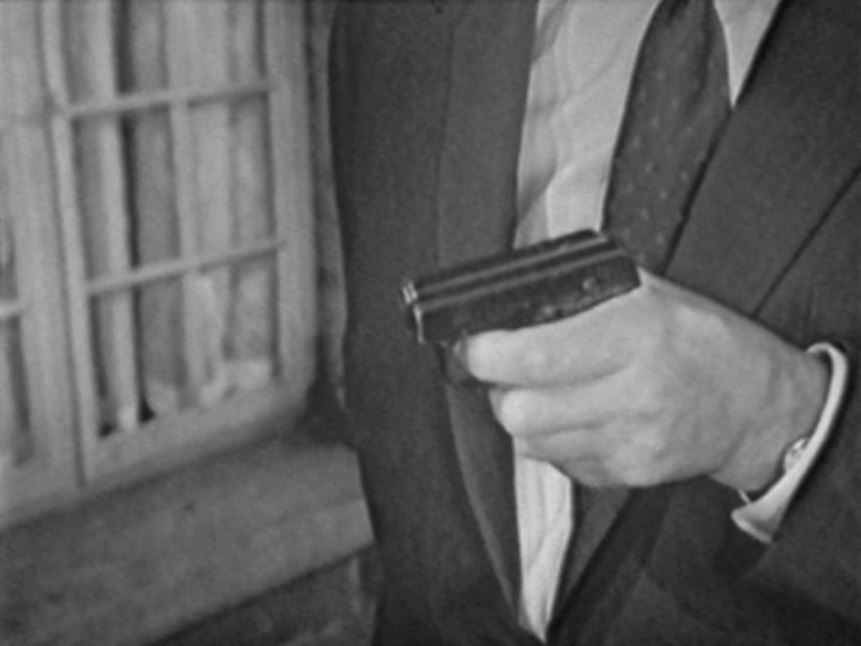
Now we have the first indications that the dealings going on at full scale are going to be important to the Doctor and his companions, as a dead insect drops out of the sky, carrying with it a strong chemical whiff. And Barbara raises a pertinent question: can whatever’s killing the insects kill them too?
They don’t have long to worry about that, as they hear the sound of a distant cannon. Well, that’s what it sounds like to them, anyway. A few minutes later, they come across Farrow’s lifeless body, and as the Doctor notes, there’s a whiff of gunpowder in the air.
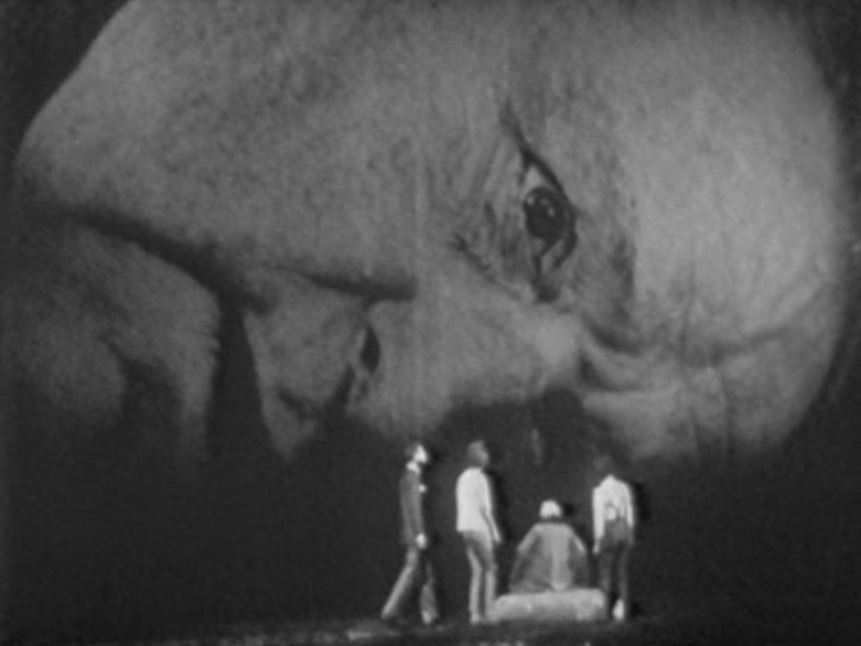
I have to say, we’re off to a great start. Creative set design and cold-blooded murder in the first twenty minutes of story. And, what’s more, a cute little enormous kitty just showed up. What’s not to love?
DANGEROUS JOURNEY
Not to worry, folks. The Doctor and Ian know just how to avoid being eaten by a gigantic housecat. You just stay still until it gets bored and wanders off. I’ve never had a cat before, but that sounds about right.
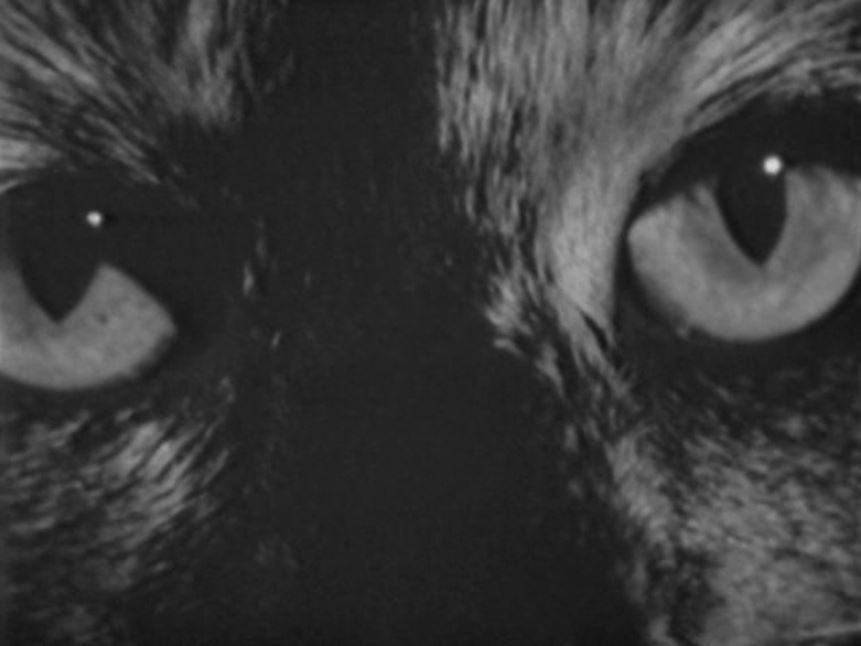
The companions wonder if they should do something about the whole murder problem, but the Doctor points out they’re tiny and it’s not as if they can do anything right now.
Along comes an enormous leg to imperil them, and Ian and Barbara make a break for the closest shelter they can find: Farrow’s briefcase.
Up at normal scale, Forester has been joined by a scientist. He’s got a white lab coat and everything, because I suppose scientists dress like that all the time. Forester tells him that it was an accident, but the scientist isn’t fooled, concluding upon examination of the body that Farrow was shot through the heart from some feet away. There are no powder burns around the bullet hole.
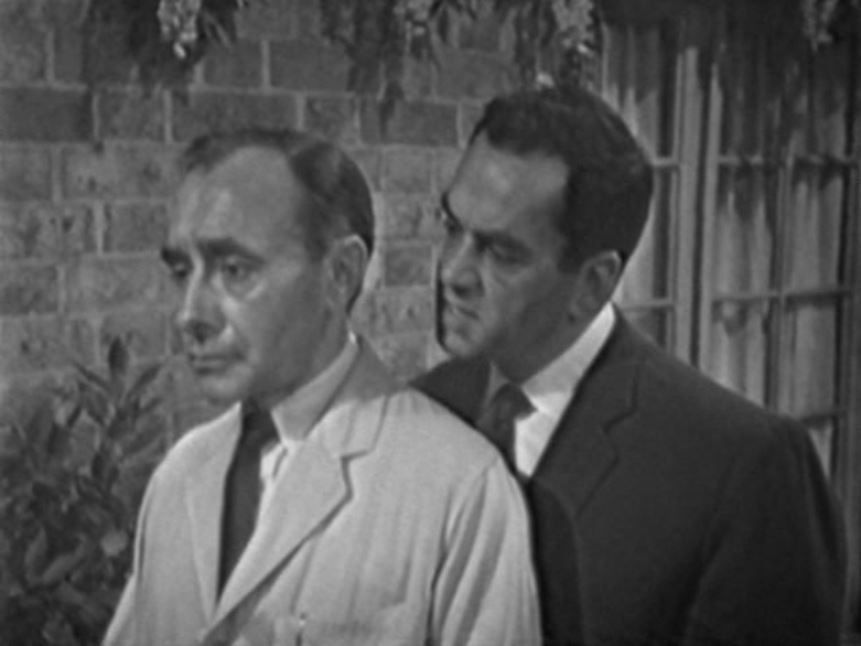
Neither of them are too upset about the death of an innocent man, though. The scientist, Smithers, is more upset that this means he’ll have to scrap the research.
Smithers does have a somewhat noble motive, though. He wants to save people from famine, which is very commendable of him. Thing is, if you go wantonly killing every single living thing that isn’t a plant in your field, you’re really just sowing the seeds of a future famine that’ll be far worse. I’d think a scientist would know that, especially one specialising in research into pest control with regards to agriculture.
The men head into the lab, taking Farrow’s briefcase with them, before heading out to hide the body. Ian and Barbara don’t enjoy the ride much. In Barbara’s words, it’s worse than the Big Dipper. I have to admit, as much as I like the Big Dipper, it is a rather rough ride. Grand National (the rollercoaster, not the horse race), on the other hand, is a must-do if you ever happen to visit Blackpool.
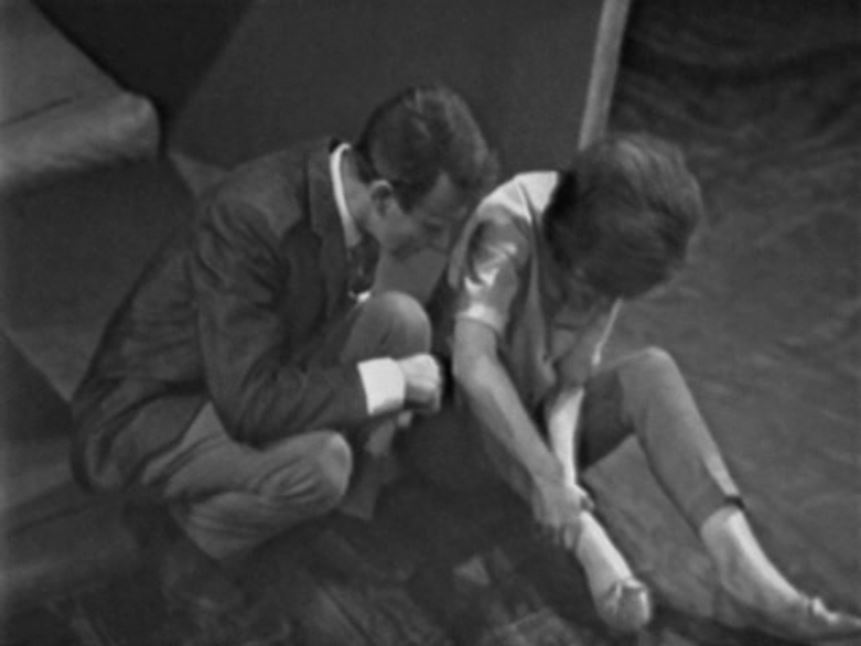
The Doctor and Susan emerge from hiding, and seeing the briefcase gone, realise that it must have been taken inside. The Doctor attempts to climb into a drainpipe, finding that it stinks to high heaven of the stuff on the dead insects. So of course they decide climbing into it is a great idea. Um, guys? Does the phrase ‘toxic fumes’ mean anything to you?
Inside, Ian and Barbara come upon some enormous grains of wheat that are covered in some sticky stuff. Not knowing what the sticky stuff is, Barbara goes ahead and touches some of it. Smart.
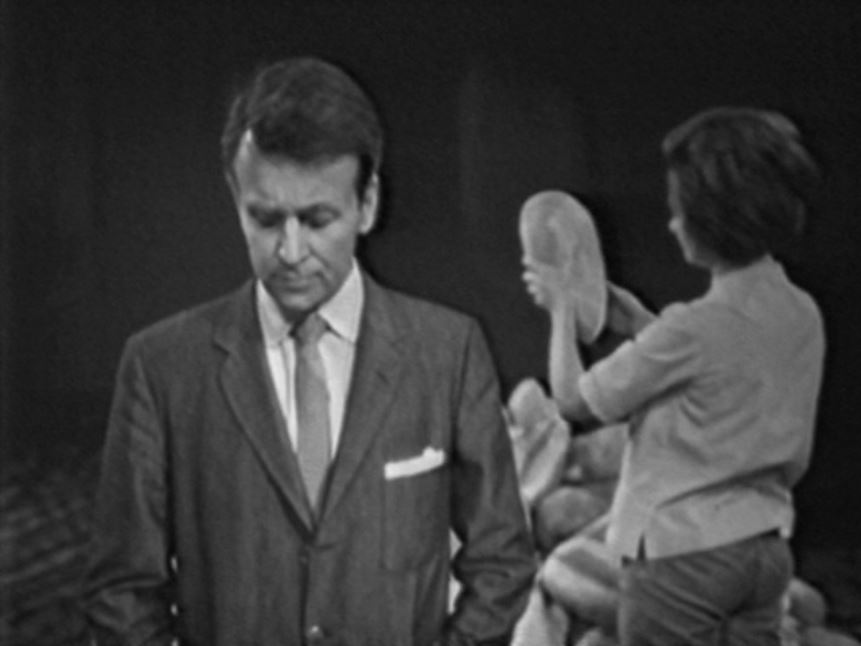
Ian has a good idea about using the paperclips in the briefcase to make a chain they can climb down, and hopefully make it back to the others. Barbara would like a look in the briefcase for herself, as her suspicion grows that her hands are covered in insecticide.
Meanwhile in the pipe, the Doctor is regretting every single decision he’s made in his life. It’s not as bad as it could be, though. The chemical runoff from the lab has corroded the inside of the pipe, so there’s plenty of hand and footholds.
Back in the house, as Ian struggles to get the briefcase open, a housefly turns up behind Barbara. It’s quite a lifelike puppet, with moving joints and everything. Barbara sees it, and faints, though it’s not clear if it’s the sight of the bloody big fly or the symptoms of poisoning setting in.
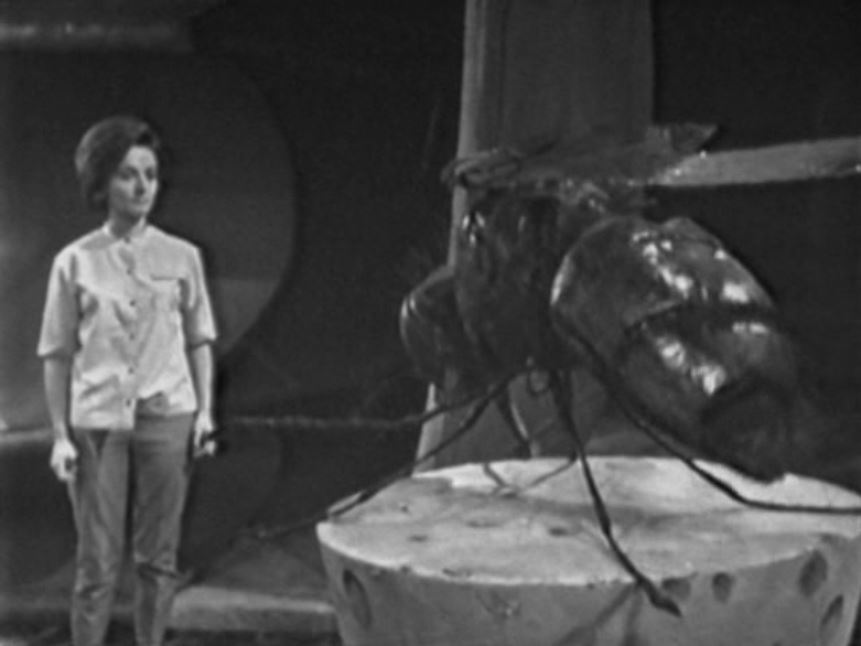
Meanwhile, Smithers and Forester have hidden the body, though Smithers is very upset with Forester for involving him in this whole sordid business.
Susan and the Doctor make it up the drainpipe and emerge at a plughole which is really pretty neat. We haven’t had so many unique sets before, I’m sure of it.
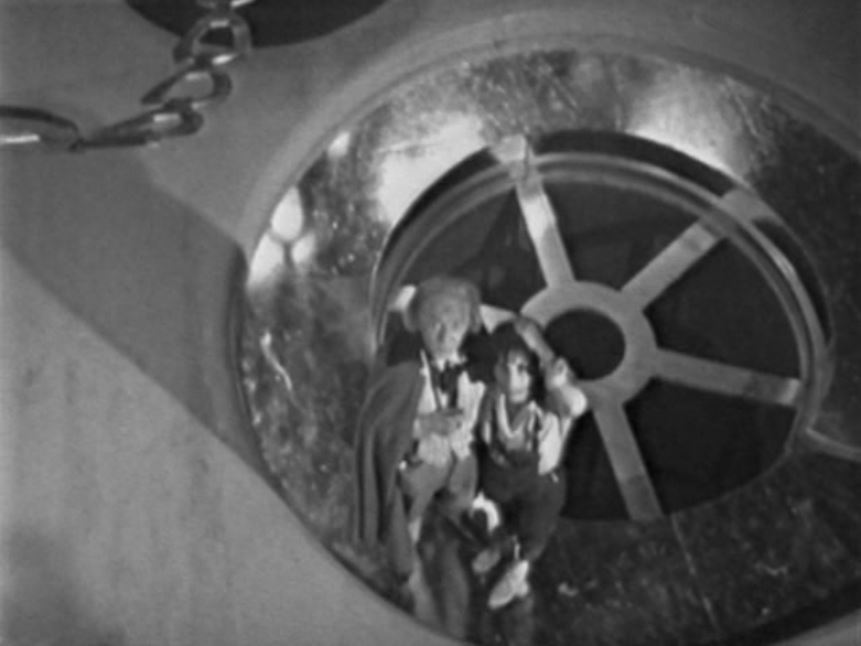
Barbara wakes up from her fainting spell, to be told by Ian that the fly flew off, then landed on the seeds and died instantly. Well, that doesn’t bode well. Barbara, now might be a good time to tell Ian about the fact you touched them, too.
But that’ll have to wait, as they hear Susan calling from the sink, and begin climbing down the plug chain towards her and the Doctor.
Outside, Smithers and Forester have just finished mopping up the blood. Now it’s time to wash their hands.
Uh-oh.
Hearing the men coming, Ian and Barbara climb back up the chain, and the Doctor and Susan start heading down the pipe.
Smithers notices the dead fly, and gets excited about how effective the insecticide is, and we get into a scene which did seem a bit inconsistent to me. Forester says something about Farrow lying about the effects of the insecticide in the report, which I don’t quite understand. I thought Smithers and Forester were on the same page about Forester killing Farrow to prevent him revealing the destructive truth of the formula and putting an end to the project. Unless Smithers thinks his work is perfectly sound, and Farrow was going to turn in a false report for his own gain? I don’t know.
The point is Forester is going to doctor the report.
Meanwhile, Farrow fills up the sink and washes his hands, while the Doctor and Susan cower in the drainpipe below.
And then he pulls the plug.
CRISIS
Ian announces to Barbara (and the viewer) that the tap has been turned on with the Doctor and Susan still being in the sink. Thank you, Ian, we can see that.
Barbara fears the Doctor and Susan have drowned, so she and Ian go to find out.
Not to worry, Barbara. It turns out that the Doctor and Susan were hiding in the overflow pipe, so managed to avoid the deluge, and out they pop, reuniting the gang at last. I swear this lot get separated so often they should make a habit of holding hands everywhere they go. Or perhaps the Doctor should put his companions on a leash.
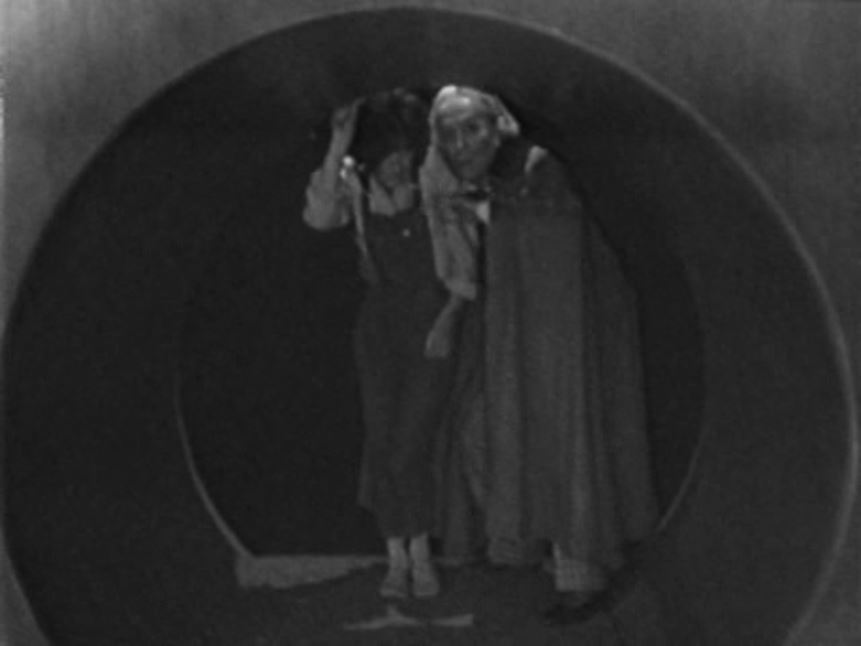
The sink set is my favourite from this serial. It’s quite simple, but the layout makes for some really cool looking shots, and it’s a very good replication of a kitchen sink.
Forester finishes doctoring the report, and puts in a call to Farrow’s department in Whitehall, pretending to be the dead man. However, the operator on the other end doesn’t seem convinced.
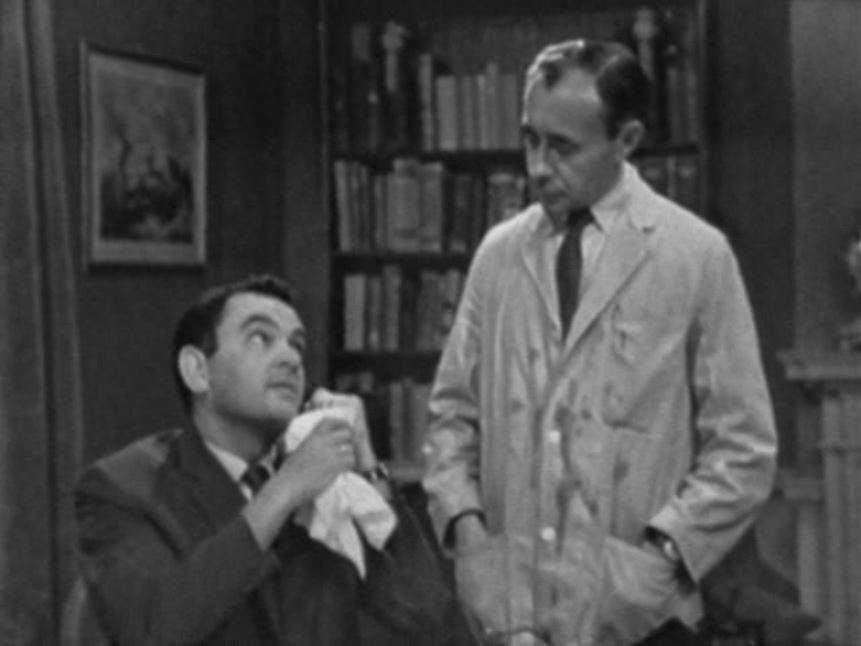
Our companions continue their trek across the lab and come across a notepad, upon which is written a chemical formula. Could it be the pesticide? Barbara suggests that knowing what it is might help them find a cure for it. Nobody else sees the value in curing it if they can simply prevent it from being used, as Barbara still hasn’t told anyone about her predicament. It’s rather pertinent information, Barbara. I suppose she doesn’t want to make a fuss. That’s… very British of her. I’m so proud.
The notebook is too big to read, so they map it out into Susan’s own notebook, and discover, after a bit of chemistry talk that goes over my head, that the insecticide doesn’t wear off or weaken over time. Meaning? Once you put it on a field, there it’ll stay. Forever. Seeping into the soil, into the groundwater.
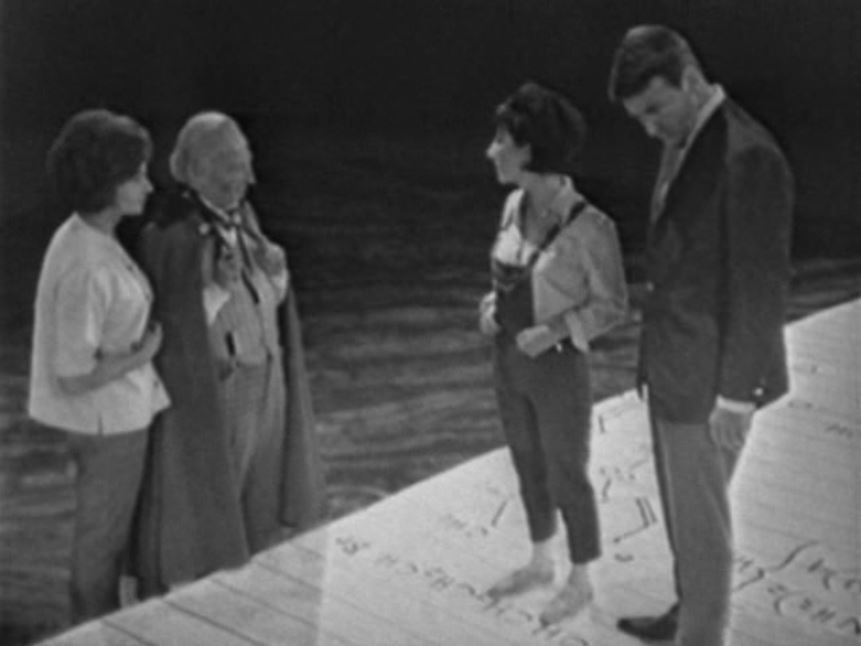
To say that would be a disaster would be an understatement. Apart from the ecological collapse that would ensue, imagine eating food contaminated with a pesticide this deadly. Even touching contaminated produce would slowly kill us.
At the sound of all this, Barbara gets quite agitated, but she still, for some reason, doesn’t tell the others. Come on, Barbara. They might start getting their bums in gear if you mention the teensy little fact that you might be about to drop down dead.
It’s not as if the others haven’t noticed. They ask her if she’s all right, but she just brushes them off. It’s a bit of a contrived way of ramping up the tension. At least, I assume that’s the intention. Can’t we have the tension ramped up with everyone being tense and worrying if they’ll manage to get Barbara back to full-size before her itty-bitty insect-sized body goes kaput?
The group decides to make an attempt at using the phone. For some reason. It struck me, as I was brushing my teeth later that night (sorry, I’m feeling a bit slow on the uptake lately), that it’d be quicker to just go back to the TARDIS, get back to proper size, and then use the phone to get the authorities.

Then again, the sight of everybody bellowing down the phone, loudly and slowly like a Brit in Benidorm trying to order some sangria, is pretty funny.
It doesn’t work, of course. Worse still, Barbara isn’t doing well at all, and she collapses. She comes around before Ian comes along, but the game’s up. She tries to tell him that she’s fine, but he grows suspicious when she won’t let him touch her hands or her handkerchief, and then she passes out again. Sniffing the handkerchief, the Doctor realises she’s suffering from the effects of the insecticide.
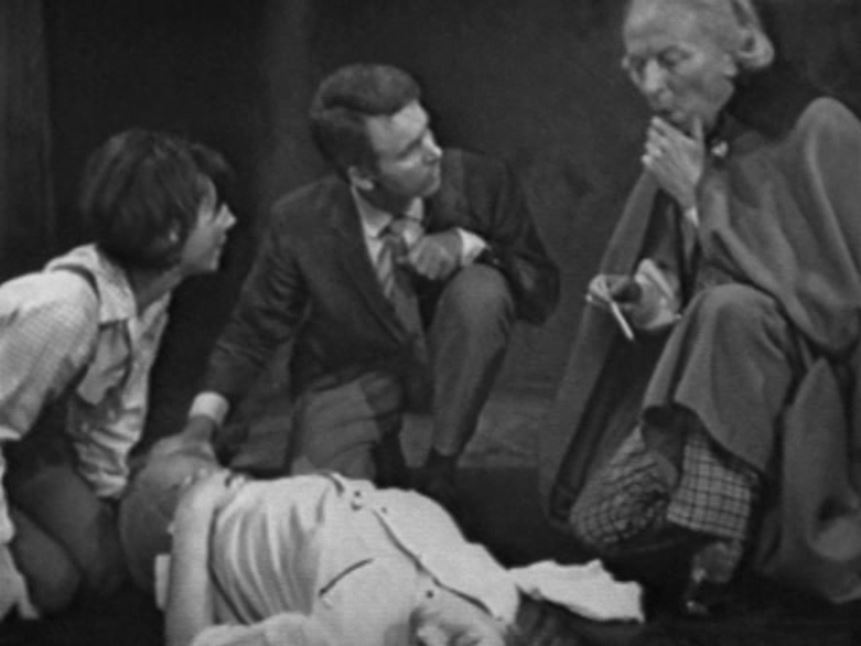
Barbara comes around just in time for a good scolding from the Doctor for not telling anyone sooner. Thank you, Doc. I was about to climb into the screen and tell her myself. However, Barbara won’t let the others take her back to the ship until they’ve put a stop to the insecticide threat. Now, that’s very nice and noble and all, but I think it’d be a lot easier at full-scale, don’t you?
Speaking of full-scale, Forester and Smithers are finishing up their dirty business, when Smithers says he wants to go back to the lab and have another look at Farrow’s notes. Behind his back, Forester pulls the gun out again, and loads it.
Back with the companions, the Doctor and Ian are being wonderful role models for children, by which I mean they decide to start a fire in order to draw the attention of the neighbours. The Doctor quite literally giggles and rubs his hands with glee at the thought of a bit of arson. I love him.
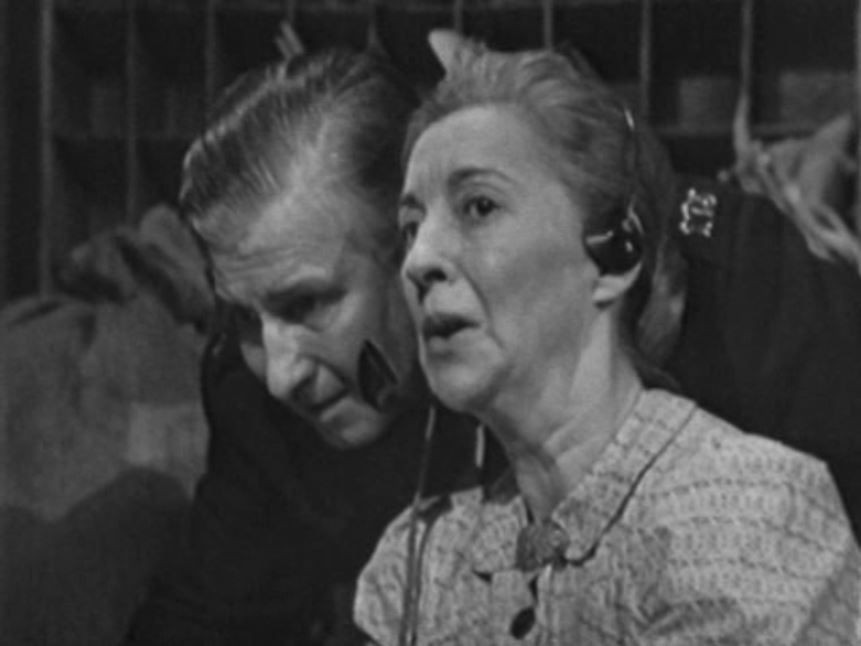
A call comes through for Farrow, but all is not as it seems, as the operator has Farrow’s superior listen with her as Forester ‘hands over’ the phone to Farrow. The pair of them agree that it sounds like he’s just impersonating Farrow.
The group are working on their arson plan. They’ve found themselves a gas tap, so now all they need to do is find a way to light it. Ian enlists Susan to help him strike a match, not an easy task when said match might as well be a battering ram.
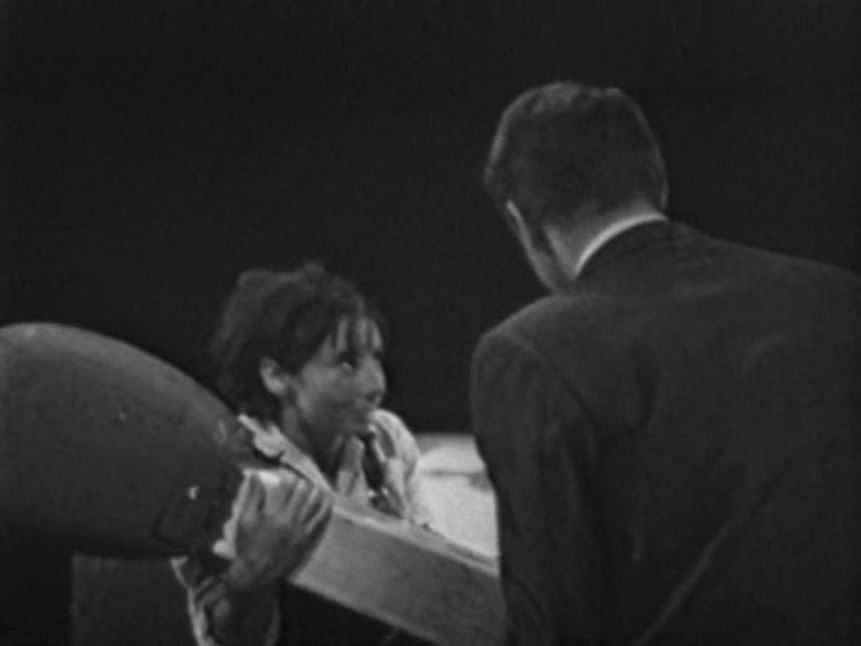
The plan’s simple enough. The Doctor has spotted a pressurised flammable canister nearby the gas tap. If they light the gas, the can will heat up, and eventually explode. The difficult part will be getting far enough away from the can before it goes boom.
While they’re doing that, Forester finally admits to Smithers the full truth of why he murdered Farrow— with a gun pointed at his chest. Looks like he’s tidying up all the loose ends.
The companions take cover, and the two men come back into the lab just as the can blows, scattering shrapnel in Forester’s face. With Forester blinded, Smithers grabs the gun, which is promptly taken from him by the police constable who has just materialised. Did the operator call him? I can only assume so, but that was a bit quick, wasn’t it? Or did he just hear the can explode? Pretty convenient that there was a passing bobby.
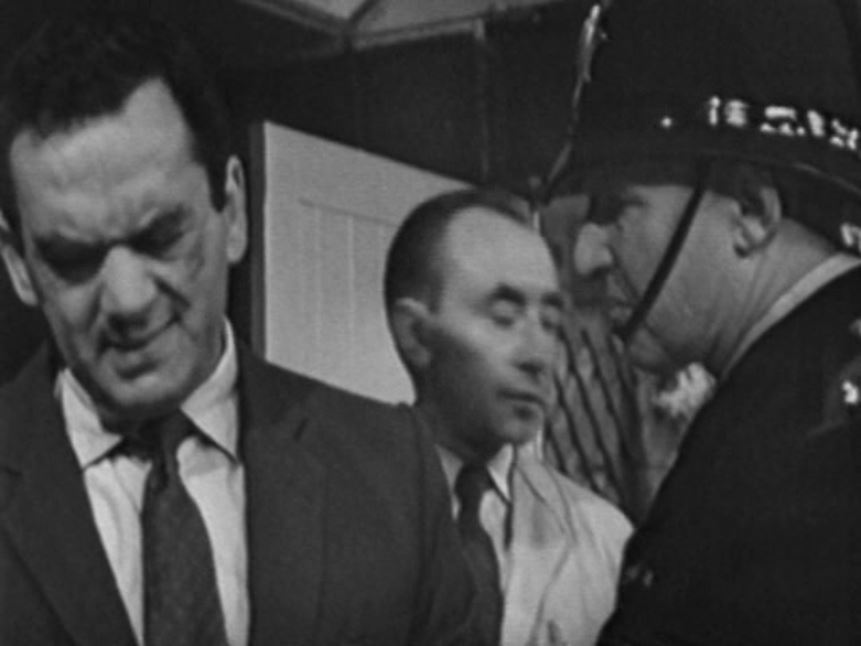
As the companions make a break for it, the Doctor grabs one of the contaminated seeds, wrapping it in his cloak to ensure he doesn’t poison himself. The group get back to the TARDIS without any trouble, and the Doctor sets about restoring them to proper size, Ian watching in amazement as the seed the Doctor brought appears to shrink before his very eyes. Of course, the seed isn’t shrinking— they’re growing.
Now at full size and having managed to get a good drink of water, Barbara does seem to be doing better. Gee. That’s just a bit convenient. The scanner’s still broken, though, so who knows where they’ll end up next?
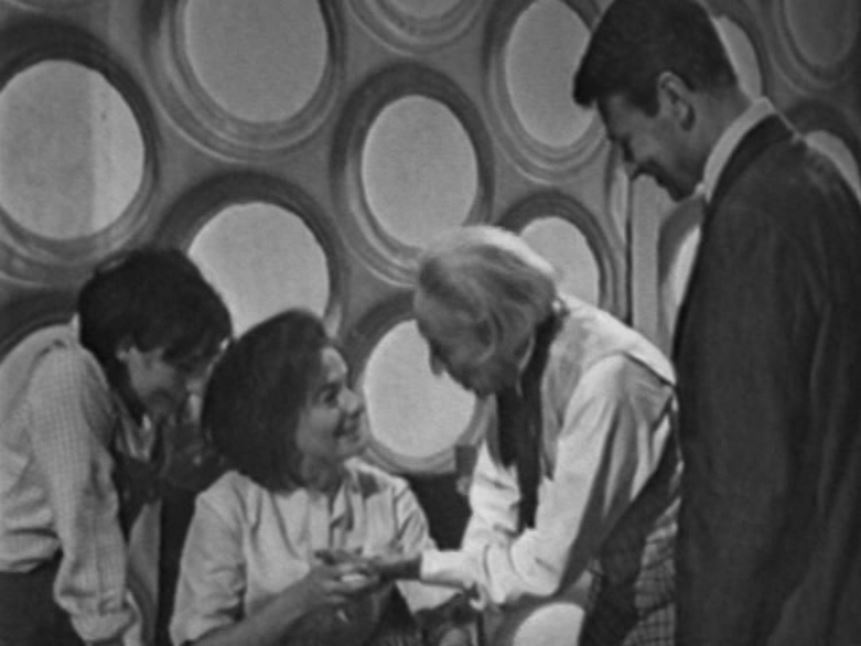
Final Thoughts
So, here we are, at the end of the first serial of the new series.
I can’t help but think that this story would have been over in five minutes if Barbara had just told everyone about the pesticide on her hands. They could have just gone back to the TARDIS to fix their size problem, then given the police a quick ring. Barbara healed, day saved, devastating environmental disaster averted. Easy.
That issue of the plot being over instantly if everyone used their brains aside, this is a very enjoyable serial. I found the three episodes to be just the right length for this story. The three-act structure is tried, tested, and approved by generations of storytellers. An issue I found with the previous series of Doctor Who was that the serials were sometimes quite poorly-paced, with some of them overstaying their welcome by an episode or two. Planet Of Giants, however, keeps up a lively pace all the way through, with no filling.
We’ve also seen a pretty excellent demonstration of the phrase ‘the road to Hell is paved with good intentions’. It applies pretty well to Smithers. Not so much with Forester. But with Smithers, yes. In his hopes of ending famine, he became an accessory to murder, and almost poisoned all our farmland.
Also, perhaps the most important factor for why I like this serial: it’s fun. Everybody wrestling with comically-oversized household objects is funny, there’s a bit of ick-factor with the giant bugs, and we’ve also got a serious murder drama subplot with an environmental twist!
It’s a scarily plausible story, tiny people aside. Modern pesticides can, and have, saved millions of lives from their boost to crop yields, but at the same time, it’s important to be careful that we’re using them safely and responsibly, with proper oversight (q.v. the troubles with DDT, and the issues brought up in Rachel Carson's Silent Spring). Honesty and integrity won out on Doctor Who, but will the same be true for us? I don’t know.
4 out of 5 stars
[Come join us at Portal 55, Galactic Journey's real-time lounge! Talk about your favorite SFF, chat with the Traveler and co., relax, sit a spell…]

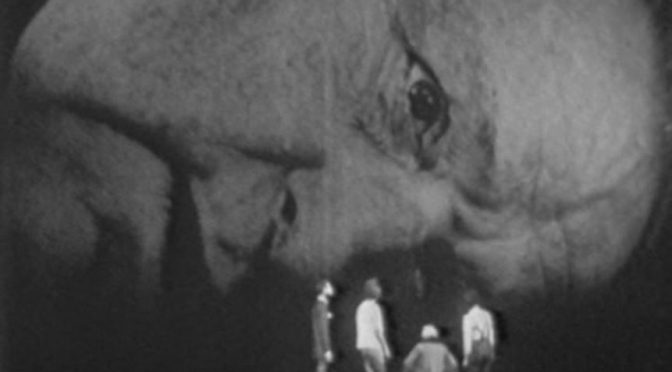

Glad to have these reviews and the show back! I also enjoyed this one , it represented a nice change of direction for the show. I don't want every week to be like this but as a one-off, good stuff.